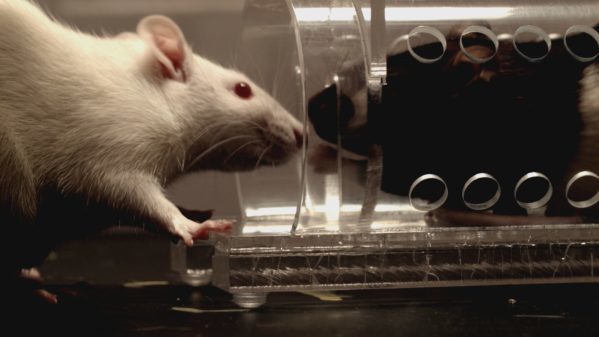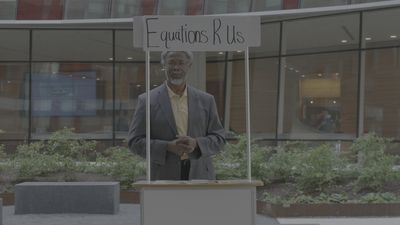INTERVIEW: ‘Through the Wormhole’ returns with provocative topics

Through the Wormhole With Morgan Freeman returns Tuesday, Aug. 30 at 10 p.m. on the Science Channel. The thought-provoking docu-series looks at life’s big questions through the lens of cutting-edge research and scientific principles. On the new season, fans can expect discussions of terrorism, gender identity and the end to privacy.
Neil Laird executive produces the show, which is entering its seventh season. “We do have a lot of provocative topics on this one, which is great,” Laird said recently in a phone interview. “We look at the prism of science and kind of see how science can tackle things that sometimes other venues or other vantage points can’t, so we’re doing one on gun violence, another one on terrorism, gender identity, the end to privacy, very topical situations and subjects that are all filtered through how science can deal with them, which is something we haven’t done to this extent in the past.”
To get started on their brainstorming process, Laird and company look at what topics scientists are covering in the field. They examine studies at universities and other organizations to get a pulse on the research.
“Then we say, ‘Oh, here’s a way we can frame a very topical, relatable subject,’” he said. “We are fortunate because of things like sexual identity, for example. So much is going on right now with gender rights and things like that, but beyond that, people are discovering there’s an X and Y chromosome that suggests you could be both sexes at once. … We find out how we can enter those very topical subjects through science rather than through a news approach.”
Occasionally the team will discard subjects that they feel cannot be sustained for an entire hour of programming. They look at the possible stories they can tell to highlight the science and then determine which topics lend themselves to television.
Laird said that Through the Wormhole tries not to alienate audiences and make them decide between answers found in science and answers found in religion or faith. The show attempts to present an issue from multiple viewpoints.
“There’s a lot of people, like Morgan himself, who are very religious people,” he said. “The gun violence, obviously a very difficult topic, we don’t come down one way or the other. We talk about both sides of the issue. Do guns make you safer? Do they make you less safe? And we leave it for you decide because that’s what scientists do. So things with spirituality and things with God versus the cosmos, we don’t set out to say, ‘Oh, science is going to supersede that.’ In fact, quite often, we have a lot of people who we interview who are very spiritual and say, ‘This kind of helps understand spirituality even more.'”

Freeman, an Oscar-winning actor, is dedicated to the series. Laird said he is involved from the planning process on each episode, and there are certain topics that are near and dear to him. This season, one episode that Freeman was particularly interested in looks at the question, can we all become geniuses?
“And it deals with neuroscience and music, and how we could use those elements to sort of increase brain waves and maybe think in ways we didn’t before,” he said. “And that’s a subject that Morgan has always been enamored of and fascinated of, so he was very much involved in that one.”
If there is new science on a previously covered topic, Through the Wormhole will explore the item once again, but the science dictates the creative decisions. Ironically, this season the team will finally explore actual wormholes, a nod to the show’s name.
“So some topics, unless the science has caught up with it, we don’t like to go back to the well and kind of repeat ourselves, but there are a lot of different ways you can kind of look and frame something,” he said. “It’s really all perspective. If you look at a show we did last season which got a lot of buzz called ‘Are We All Bigots?’ It was really a show about evolution. It was a way to sort of frame evolution, and why we think the way we do and the way we evolve.”

Science and history have always been Laird’s bailiwick. In the last five or six years, he became fascinated by the human brain, and he helped shepherd along a show on National Geographic called Brain Games, which got him excited about biology and the mysteries of the brain.
“There’s so much science going on on all these topics, whether it’s internal or external, that it’s hard not to be excited when you start working for a place like Science Channel,” he said. “We have endless subjects we can deal with.”
He added: “Wormhole can come along, kind of take these very obtuse topics and kind of make them very relatable and very understandable, and certainly with the advent of things like YouTube and all the stars on the Internet that now have five- or six-minute videos about science. There’s a whole legion of young people that are fascinated by science that weren’t before, so a lot of young people are being tapped into what would seem very heady, textbook ways but through these sort of bite-size, very palatable, relatable ways of telling it, which is something we try to do with science all the time because the Science Channel itself on the surface, it sounds like it’s going to be a textbook event. Turn the channel, and you’re going to be back in the 10th-grade biology class. And we always got to make sure it’s clear that’s not how we tell a story. Everything has to have a story, whether it’s a show about the fall of ancient Egypt or about the workings of the brain.”
By John Soltes / Publisher / John@HollywoodSoapbox.com
The new season of Through the Wormhole With Morgan Freeman premieres Tuesday, Aug. 30 at 10 p.m. on the Science Channel. Click here for more information.

